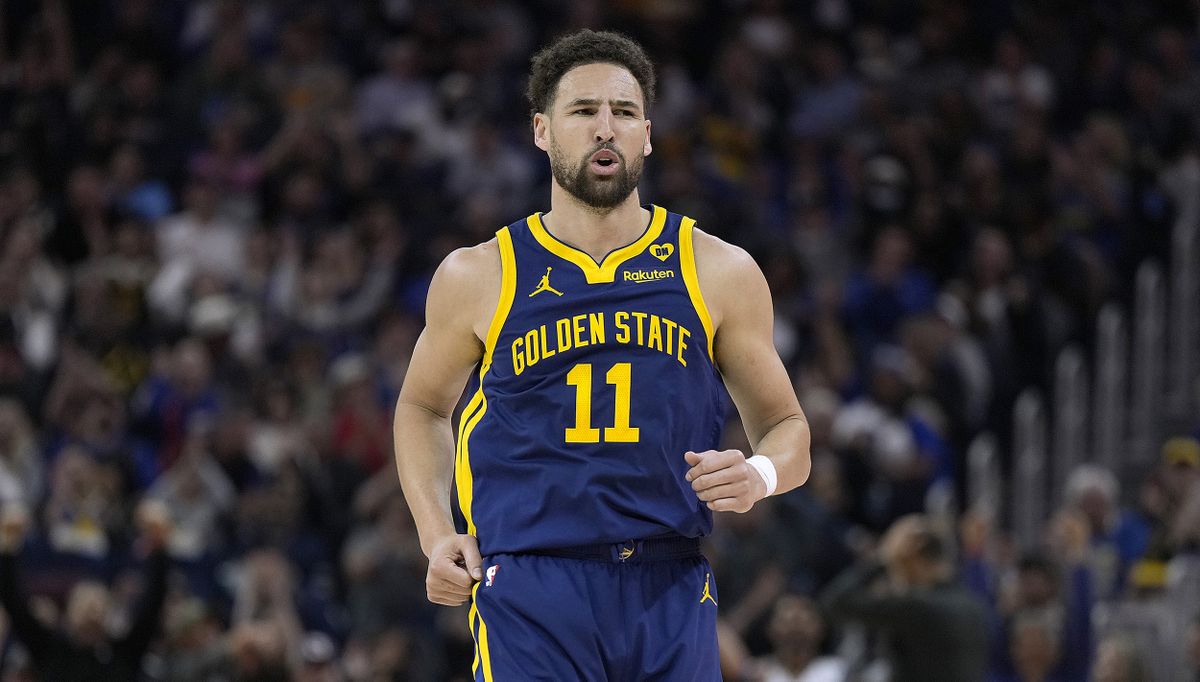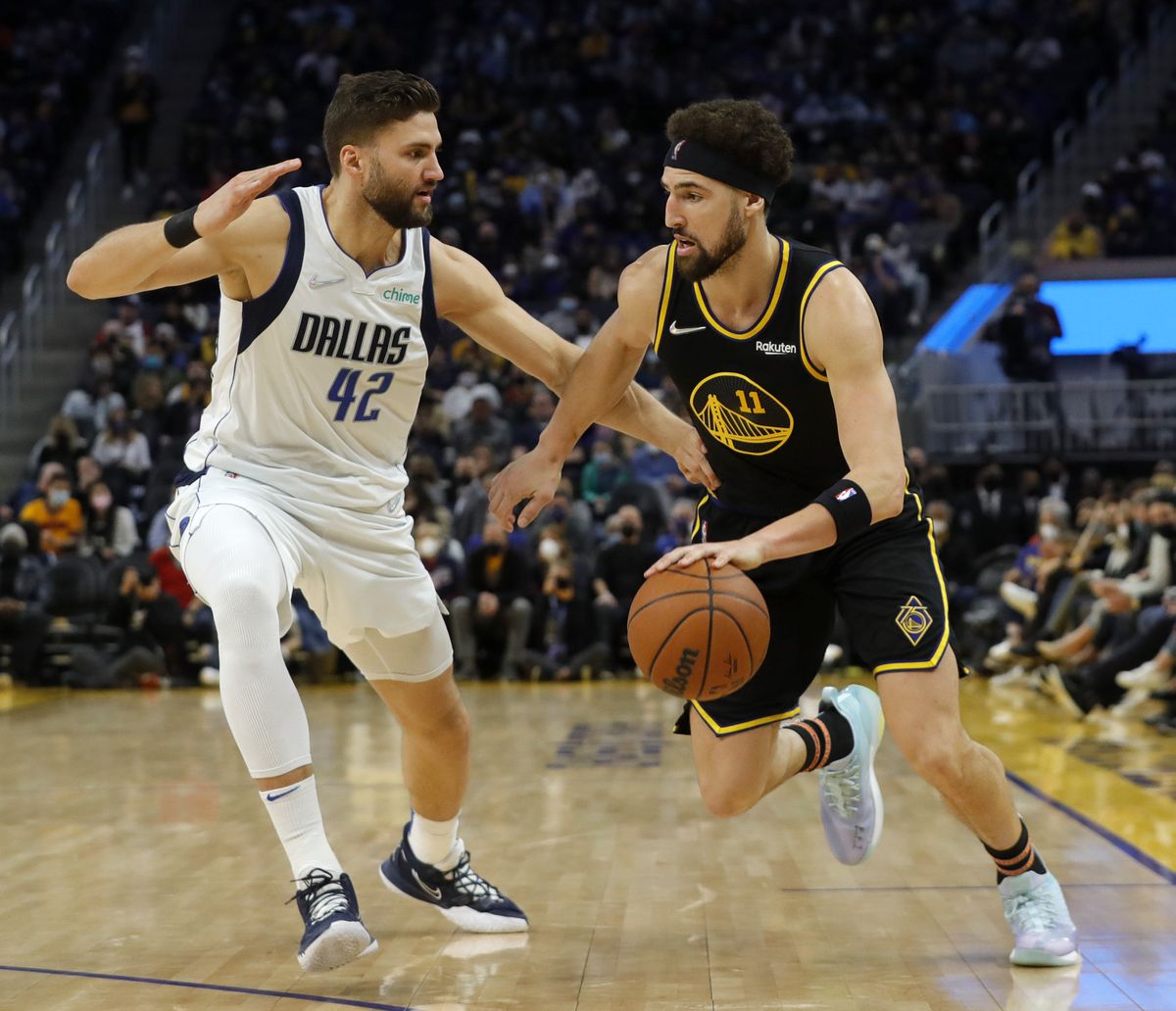Commentary: We forget how good Klay Thompson was. He can’t.
Klay Thompson, drafted by Golden State at No. 11 out of Washington State in 2011, heads to Dallas with a chance at a fresh start. (Tribune News Service)
In the end, Klay Thompson wanted to be in control again. It’s hard to blame him. He had been forced to play defense for the past five years, recovering from major injuries, adjusting to a repaired body and a revised team, dealing with regression and drama and uncertainty.
He had devolved from a star whom Steve Kerr, the Golden State Warriors’ coach, often hailed as “no maintenance” to an anxious and confused veteran who needed regular affirmation. As he strove to recapture his greatness – or, better yet, find peace with a revamped identity – he yearned for one more commitment from the Warriors, something he felt he deserved after 13 seasons, five NBA All-Star appearances and four championships. He wanted a fourth contract from the team that drafted him No. 11 overall in 2011, a chance to live out the evaporating years of a dynasty with Stephen Curry and Draymond Green. But for as much as Thompson, Curry, Green and Kerr hoped their run could end on the court, business interrupted their dream.
Thompson is gone now, off to Dallas to wear a different NBA uniform for the first time. After two awkward years of tepid negotiations with the Warriors, he took command in free agency and concluded a period of misunderstandings and hurt feelings by walking away. To complete an era of good shooting and better vibes, the former no-maintenance star slammed the door shut on one of the greatest and most original teams in NBA history.
The Splash Brothers duo is no more. The last vestiges of the league’s superteam era have vanished. That period actually yielded to parity during Game 6 of the 2019 NBA Finals, when Thompson tore the ACL in his left knee one game after Kevin Durant ruptured his right Achilles tendon. The NBA, which hasn’t crowned a repeat champion since the Warriors swept the Cleveland Cavaliers in 2018, is much different now. With a new collective bargaining agreement that targets big-spending teams with more vigor than ever, it is legislated to remain that way.
Five years ago, it would have been farcical to predict Thompson’s tenure ending like this. Two years ago, when Golden State claimed the fourth title of its dynasty, he seemed on the other side of surgeries to his left knee and right Achilles tendon that cost him two prime seasons. Just a year ago, the former Washington State standout led the NBA with 301 3-pointers.
But despite the ambitions and big talk of Golden State majority owner Joe Lacob, financial prudence hindered the Warriors’ ability to remain as we have known them. The front office slow-played a Thompson extension, trying to sequence every contract in a sensible manner. Given the onerous restrictions of the NBA’s new two-apron tax system – one that adds layers of complications for high-payroll teams trying to improve – it was impossible for the Warriors to reward every deserving player. Someone was bound to get offended amid the delicate process. Stunningly, it wound up being Thompson, one of the great complementary stars the league has known.
Ego and entitlement got the best of the Warriors, who had established a regenerative kind of excellence over the past decade. Their joyful nature, once a defining characteristic, fractured when Green punched Jordan Poole before the 2022-23 season. Since then, they have gone 90-74 with one second-round exit and one loss in the play-in tournament. Poole, who signed a four-year, $140 million contract before the Green incident, had an understandably poor final season in Golden State. He was traded to the Washington Wizards last offseason. Andrew Wiggins, who signed a $109 million contract extension after the title, hasn’t been the same and is now on the trade block. Despite many acts of disruptive behavior, the Warriors rewarded Green with a $100 million extension a year ago.
Once a team-building standard, the Warriors have struggled with asset management, talent evaluation and player development. They sustained a high level longer than most do in professional sports, but every mistake started to add up. They paid an estimated $177 million in luxury tax penalties this past season. Add it to their payroll, and the team cost about $384 million. The Warriors went 46-36.
Thompson, already frustrated with having to wait in line, recorded the most disappointing season of his career. He still averaged 17.9 points and shot 38.7% on 3-pointers. They are good numbers for a 34-year-old role player, but Thompson would never be comfortable with that label – not in Golden State. He’s a foundational member of an all-time team. His No. 11 jersey will hang in the rafters. He might even be worthy of a statue. He couldn’t accept a diminished reputation, especially without his value being recognized with another hefty contract. So fearful of overpaying Thompson, the Warriors wanted to understand his market before putting an offer on the table that both sides could stomach.
Thompson needed assurances. He needed to feel valued again after all the physical and mental strain he endured. The Warriors probably wanted some credit for giving him a $190 million contract weeks after he tore his ACL in 2019. In the 2½ seasons Thompson missed, the franchise paid him about $85 million to rehab. But in their failure to communicate, both parties failed to give each other grace. When free agency began, Thompson wanted to choose, not compromise. It made the Mavericks, a rising team looking at him with fresh eyes, an attractive suitor.
I always thought Green would be the core member to depart. But when he backed the franchise into a corner with his anger and foolishness, Golden State stuck with him, partly because the Warriors’ tiny frontcourt would be in a disastrous state without his defense, physicality and playmaking. In a sense, Thompson is the latest casualty of the franchise’s commitment to Green.
On the other hand, Green was willing to play the negotiating game the Warriors’ way. For all his shortcomings, he never became too sensitive about business. And when he makes mistakes – including a suspension that cost him 12 games after an incident with Jusuf Nurkic in December – he is good at clearing the air. During his toughest times, Thompson has been inward.
Acceptance is a huge part of longevity. Thompson cannot yet accept what age and deterioration have done to his body. We have forgotten how good he was. He hasn’t. How could he? In his mind, he’s still the guy who scored 30 points in three quarters of Game 6 of the 2019 Finals. He’s still the guy who averaged 26 points while shooting 54.1% overall and 58.5% on 3-pointers in that series. He was at the top of his game – and then his knee buckled after a dunk attempt against the Toronto Raptors. It would be 941 days and another devastating injury until he played again.
He was robbed. It’s sad. It’s also the cruel and cyclical nature of sports, which have a low tolerance for fairy tales.
So the best run of Thompson’s basketball life is over. It may have been the Warriors’ miscalculation. Or it may prove to be necessary salary cap management. But Thompson had the final decision, at least. He needed to be the one to make it. He gets to start over, if he can find it in himself to do so.

